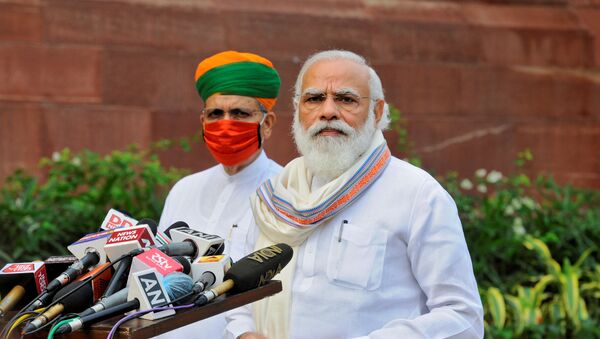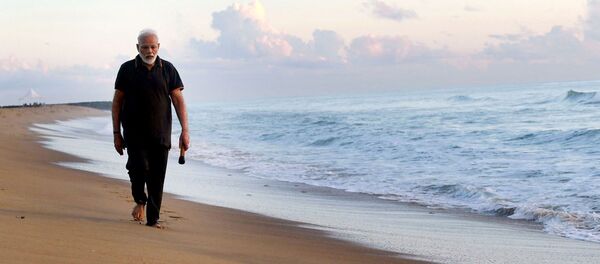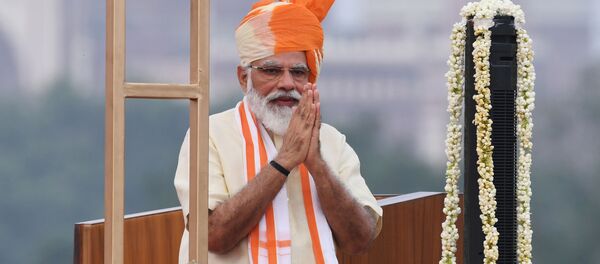Continuing with his popular image of taking tough, rather risky decisions, Indian Prime Minister Narendra Modi has been sailing through various storms regardless of his party – BJP-- facing occasional setbacks in polls held for State legislatures.
Under Modi, the Indian government has taken several decisions, unprecedented in the independent history of the country, and they were hailed by a huge section of the population and assailed by his detractors.
As Modi appears to be securing his distinct place as Prime Minister of the country, his 70th birthday brings an opportunity to revisit his government’s five key decisions that hold immense significance for Indian voters.
Triple Talaq
The Modi government made a law to criminalise Triple Talaq, making the method of instantly divorcing one’s wife by pronouncing ‘Talaq’ (divorce) thrice, a criminal offence. Despite objections, Modi’s BJP dominated Indian Parliament succeeded in passing legislation on 30 July last year, the Muslim Women (Protection of Rights on Marriage) Act, 2019.
The legislation was a sequel to a judgement by the Supreme Court of India made in August 2017, declaring instant divorce among Muslims as ‘void, illegal and unconstitutional’, and required the federal government to introduce legislation.
‘Talaq’ in Islam means dissolution of marriage when a Muslim man can severe all marital ties with his wife by merely uttering the word ‘Talaq’ thrice.
While several Islamic bodies decried the move, many opposition parties indirectly supported the government. The main opposition party, Congress, however, criticised the government for making it a criminal offence.
Abrogation of Article 370 and Bifurcation of Jammu and Kashmir
Jammu And Kashmir State enjoyed a special status among Indian states under Article 370 of the Indian Constitution. The article was titled ‘Temporary, Transitional and Special Provisions’, and was retained by the Constituent Assembly of Kashmir.
It meant that the State enjoyed autonomy to make laws, except in subjects like defence, foreign affairs, communications and currency.
On 5 August 2019, India amended the constitution to abrogate Article 370 and Article 35A, thus stripping the erstwhile state of Jammu and Kashmir of its special status.
Opposition parties in the country were divided on the issue, including the main opposition Congress party. Former Congress President Rahul Gandhi said that “National integration isn’t furthered by unilaterally tearing apart J&K, imprisoning elected representatives and violating our Constitution.”
Pakistan, which claims Kashmir as well, declared a diplomatic war against India on the issue and suspended diplomatic, communication and trade links. Besides Pakistan, China and Malaysia were vocal in their opposition to the move.
Citizenship Amendment Act
Another major decision of India’s nationalist federal government was Citizenship Amendment Act (CAA) of 2019, passed by Parliament on 11 December 2019. It allows illegal migrants from Hindu, Sikh, Buddhist, Jain, Parsi, and Christian religious minorities from neighbouring Afghanistan, Bangladesh, and Pakistan to obtain Indian citizenship.
As a large section of Muslims was concerned that the law would deprive them of their Indian citizenship, the Modi government clarified that the legislation was not related to any Indian citizen.
Law on Terrorism
The Modi government introduced legislation to fight terrorism with the passage of the Unlawful Activities (Prevention) Amendment Act in August 2019. The amended act gives sweeping powers to security forces to arrest any person and label him or her a terrorist, without registering a mandatory first information report, charge sheet or jury trial.
The stated objective of the new amendments was to facilitate the speedy investigation and prosecution of terror-related offences.
Lord Ram Temple in Ayodhya
Following a verdict by the Supreme Court of India on 9 November, 2019 to settle a land dispute between Hindus and Muslims in Ayodhya, a town in the state of Uttar Pradesh, the Modi-led federal government moved swiftly to fulfil one of the BJP’s key poll promises – the construction of a Ram Temple on the spot considered to be the birthplace of Lord Ram.
Prime Minister Modi laid the foundation for the temple on 5 August in Ayodhya, saying: “Ram Mandir will turn into a symbol to integrate India. It will be a unique gift to the world from justice-loving India.”
The groundbreaking was the culmination of a 500-year-old dispute between Hindus and Muslims. Hindus claim Mughal ruler Babur had demolished the Ram Temple and constructed a mosque there in the 16th century.




